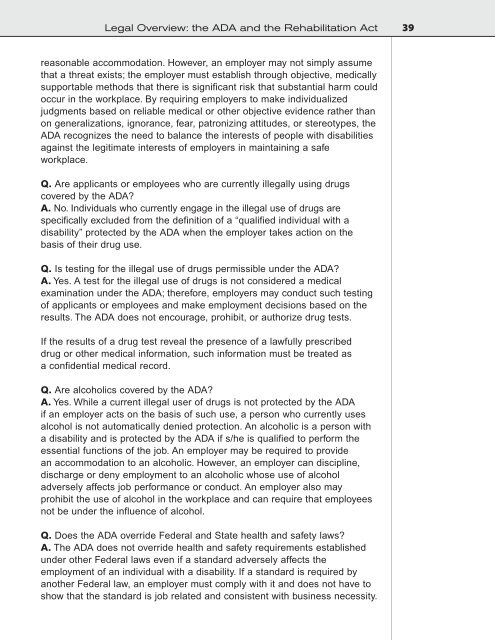Design for Accessibility: A Cultural Administrator's Handbook
Design for Accessibility: A Cultural Administrator's Handbook
Design for Accessibility: A Cultural Administrator's Handbook
You also want an ePaper? Increase the reach of your titles
YUMPU automatically turns print PDFs into web optimized ePapers that Google loves.
Legal Overview: the ADA and the Rehabilitation Act 39<br />
reasonable accommodation. However, an employer may not simply assume<br />
that a threat exists; the employer must establish through objective, medically<br />
supportable methods that there is significant risk that substantial harm could<br />
occur in the workplace. By requiring employers to make individualized<br />
judgments based on reliable medical or other objective evidence rather than<br />
on generalizations, ignorance, fear, patronizing attitudes, or stereotypes, the<br />
ADA recognizes the need to balance the interests of people with disabilities<br />
against the legitimate interests of employers in maintaining a safe<br />
workplace.<br />
Q. Are applicants or employees who are currently illegally using drugs<br />
covered by the ADA?<br />
A. No. Individuals who currently engage in the illegal use of drugs are<br />
specifically excluded from the definition of a “qualified individual with a<br />
disability” protected by the ADA when the employer takes action on the<br />
basis of their drug use.<br />
Q. Is testing <strong>for</strong> the illegal use of drugs permissible under the ADA?<br />
A. Yes. A test <strong>for</strong> the illegal use of drugs is not considered a medical<br />
examination under the ADA; there<strong>for</strong>e, employers may conduct such testing<br />
of applicants or employees and make employment decisions based on the<br />
results. The ADA does not encourage, prohibit, or authorize drug tests.<br />
If the results of a drug test reveal the presence of a lawfully prescribed<br />
drug or other medical in<strong>for</strong>mation, such in<strong>for</strong>mation must be treated as<br />
a confidential medical record.<br />
Q. Are alcoholics covered by the ADA?<br />
A. Yes. While a current illegal user of drugs is not protected by the ADA<br />
if an employer acts on the basis of such use, a person who currently uses<br />
alcohol is not automatically denied protection. An alcoholic is a person with<br />
a disability and is protected by the ADA if s/he is qualified to per<strong>for</strong>m the<br />
essential functions of the job. An employer may be required to provide<br />
an accommodation to an alcoholic. However, an employer can discipline,<br />
discharge or deny employment to an alcoholic whose use of alcohol<br />
adversely affects job per<strong>for</strong>mance or conduct. An employer also may<br />
prohibit the use of alcohol in the workplace and can require that employees<br />
not be under the influence of alcohol.<br />
Q. Does the ADA override Federal and State health and safety laws?<br />
A. The ADA does not override health and safety requirements established<br />
under other Federal laws even if a standard adversely affects the<br />
employment of an individual with a disability. If a standard is required by<br />
another Federal law, an employer must comply with it and does not have to<br />
show that the standard is job related and consistent with business necessity.


